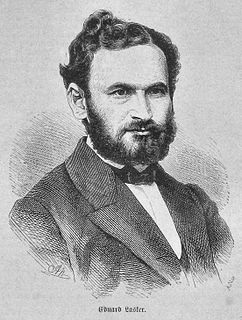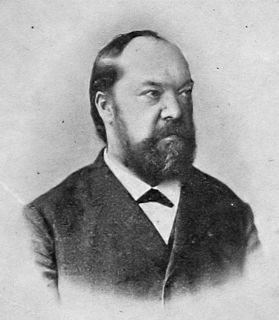
Ludwig Bamberger was a German Jewish economist, politician, revolutionary and writer.

The German Democratic Party was a center-left liberal party in the Weimar Republic. Along with the German People's Party, it represented political liberalism in Germany between 1918 and 1933. It was formed in 1918 from the Progressive People's Party and the liberal wing of the National Liberal Party, both of which had been active in the German Empire.

The National Liberal Party was a liberal party of the North German Confederation and the German Empire which flourished between 1867 and 1918.
The Progressive People's Party was a social liberal party of the late German Empire.
The Free Conservative Party was a liberal-conservative political party in Prussia and the German Empire which emerged from the Prussian Conservative Party in the Prussian Landtag in 1866. In the federal elections to the Reichstag parliament from 1871, it ran as the German Reich Party. DRP was classified as centrist or centre-right by political standards at the time, and it also put forward the slogan "conservative progress".
This article aims to give a historical outline of liberalism in Germany. The liberal parties dealt with in the timeline below are, largely, those which received sufficient support at one time or another to have been represented in parliament. Not all parties so included, however, necessarily labeled themselves "liberal". The sign ⇒ denotes another party in that scheme.

Eduard Lasker was a German politician and jurist. Inspired by the French Revolution, he became a spokesman for liberalism and the leader of the left wing of the National Liberal party, which represented middle-class professionals and intellectuals. He promoted the unification of Germany during the 1860s and played a major role in codification of the German legal code. Lasker at first compromised with Chancellor Otto von Bismarck, who later strenuously opposed Lasker regarding freedom of the press. In 1881, Lasker left the National Liberal party and helped form the new German Free Thought Party.

Eugen Richter was a German politician and journalist in Imperial Germany. He was one of the leading advocates of liberalism in the Prussian Landtag and the German Reichstag.

The National-Social Association was a political party in the German Empire, founded in 1896 by Friedrich Naumann. It sought to synthesise liberalism, nationalism and non-Marxist socialism with Protestant Christian values in order to cross the ideological front lines and draw workers away from Marxist class struggle. However, it never grew beyond a minor party of intellectuals which failed to gain mass support in elections.
The German Progress Party was the first modern political party in Germany, founded by liberal members of the Prussian House of Representatives in 1861 in opposition to Minister President Otto von Bismarck.
The German Free-minded Party or German Radical Party was a short-lived liberal party in the German Empire, founded on 5 March 1884 as a result of the merger of the German Progress Party and the Liberal Union, an 1880 split-off of the National Liberal Party.
The German People's Party was a German liberal party created in 1868 by the wing of the German Progress Party which during the conflict about whether the unification of Germany should be led by the Kingdom of Prussia or Austria-Hungary supported Austria. The party was most popular in Southern Germany.

Theodor Barth was a German liberal politician and publicist. He was a member of the Reichstag between 1881 and 1884, between 1885 and 1898, and between 1901 and 1903.

Albert Hänel was a German jurist, legal historian and liberal politician. He was one of the leaders of the German Progress Party, and served as Rector of the University of Kiel. He served as a member of the Prussian Chamber of Deputies, the Reichstag of the North German Confederation and the Imperial Reichstag, and was Vice President of both the Prussian Chamber of Deputies and the Imperial Reichstag.

The Reichstag of the German Empire was Germany's lower house of parliament from 1871 to 1918. Within the governmental structure of the Reich, it represented the national and democratic element alongside the federalism of the Bundesrat and the monarchic and bureaucratic element of the executive, embodied in the Reich chancellor. Together with the Bundesrat, the Reichstag had legislative power and shared in decision-making on the Reich budget. It also had certain rights of control over the executive branch and could engage the public through its debates. The emperor had little political power, and over time the position of the Reichstag strengthened with respect to the Bundesrat.
The Free-minded Union or Radical Union was a liberal party in the German Empire that existed from 1893 to 1910.

Georg von Siemens was a German banker and liberal politician.

The Reichstag of the North German Confederation was the federal state's lower house of parliament. The popularly elected Reichstag was responsible for federal legislation together with the Bundesrat, the upper house whose members were appointed by the governments of the individual states to represent their interests. Executive power lay with the Bundesrat and the king of Prussia acting as Bundespräsidium, or head of state. The Reichstag debated and approved or rejected taxes and expenditures and could propose laws in its own right. To become effective, all laws required the approval of both the Bundesrat and the Reichstag. Voting rights in Reichstag elections were advanced for the time, granting universal, equal, and secret suffrage to men above the age of 25.
The Jesuits Law (Jesuitengesetz) of 4 July 1872 forbade Jesuit institutions on the soil of the new German empire.

Heinrich Edwin Rickert was a German journalist and liberal politician. He was the father of the philosopher Heinrich Rickert.











